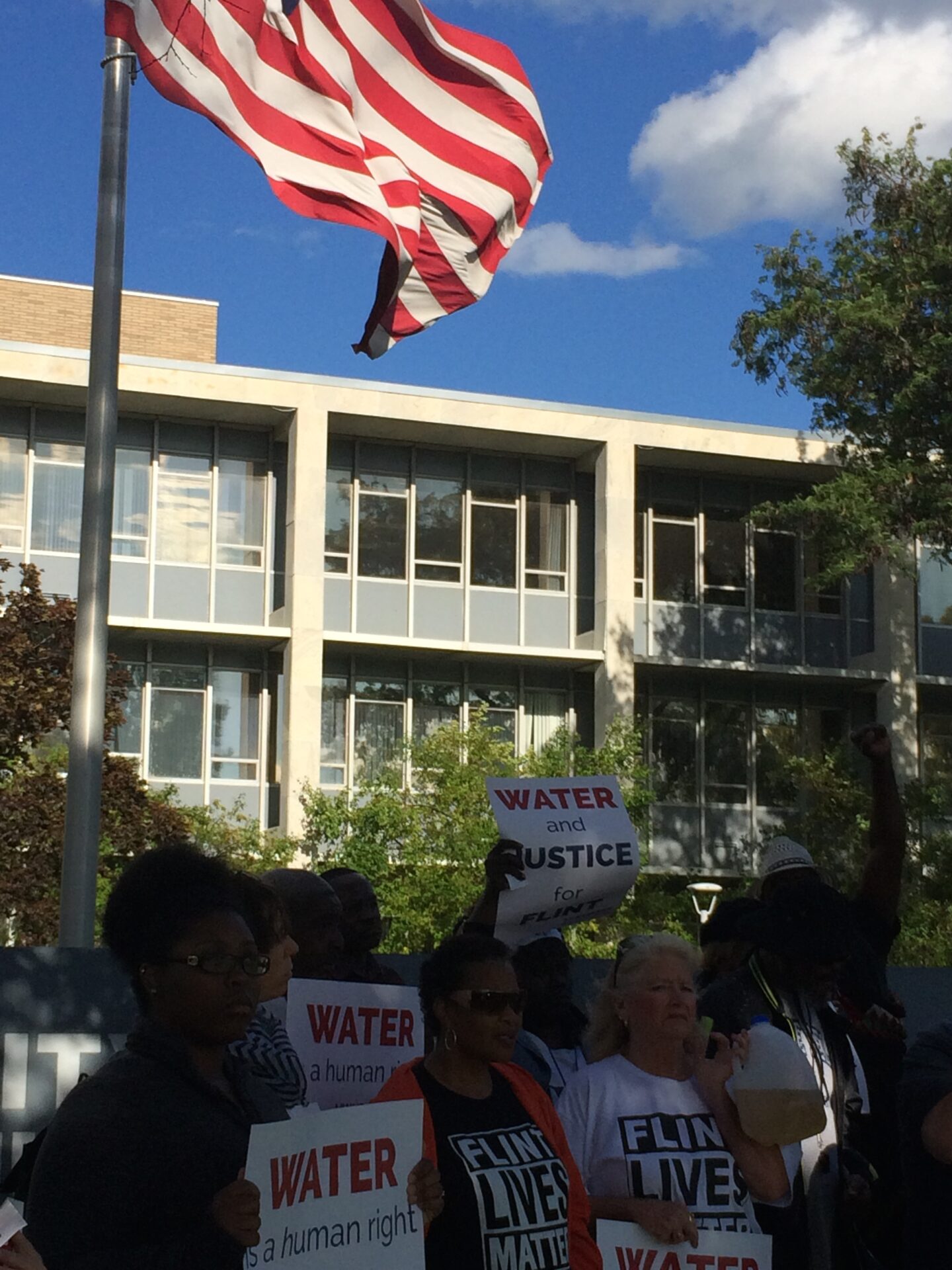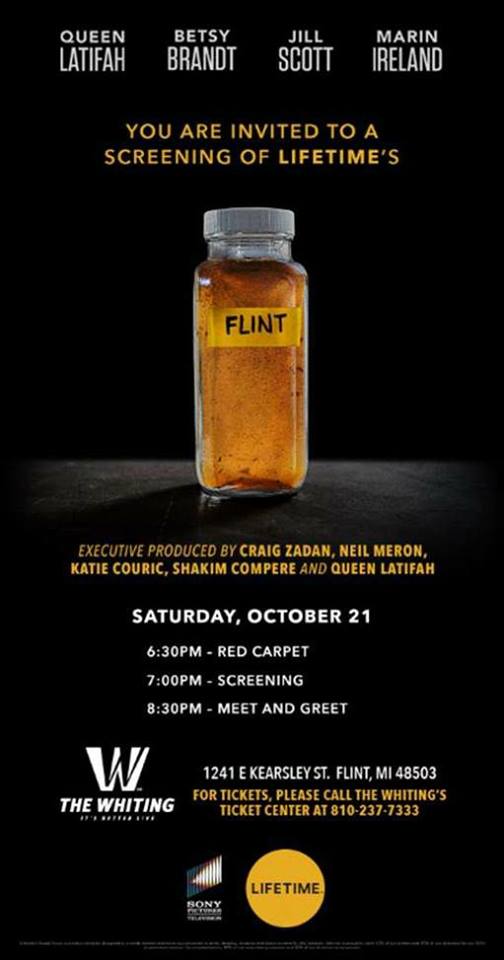By Jan Worth-Nelson
Former Flint Mayor Dayne Walling, an omnipresent and embattled figure in the Flint water crisis until his defeat for re-election in November, 2015, sat quietly with his wife near the back of the auditorium last week as producers from the PBS science series NOVA unveiled their documentary, “Poisoned Water” to a Flint audience. (See account of the premiere here)
“It was very hard to watch,” he said in an interview after the premiere, “It was very hard to watch what’s now been years of trauma and legal and political and racial complexities, all compacted into 50 minutes. I think the NOVA show lives up to the show’s tradition of focusing on science, getting to the facts, trying to make some very complex issues accessible to people who are willing to pay attention.”
But he said he thought the show should have clarified the culpability of the State of Michigan, in particular the state-imposed emergency manager system, which he says hamstrung him and the City Council and which he holds centrally responsible for what happened in Flint.
It’s a very personal story to him. In a January interview with EVM writer Harold C. Ford, Walling said, of the moment in 2014 when, as a mayor with otherwise little power, he pushed the button putting the city onto Flint River water, “I will regret that every day of my life for the rest of my life.”

Former Flint Mayor Dayne Walling (Photo by Jan Worth-Nelson)
Does not expect indictment
The film, which airs on PBS stations at 9 p.m. Wednesday, details the science of the crisis, beginning with the complications of using river water and summarizing the dramas of how the truth about the water — and its devastating consequences — gradually unfolded. The narrative describes a chronology of dogged science, frequently running up against denial, deception and political resistance. Thirteen state and city officials have been indicted by state Attorney General Bill Schuette.
Walling was not one of them. And though he was in the nexus of the spiraling tragedy, he doesn’t expect to be.
“I didn’t do anything criminal,” Walling said. “So that’s not a concern of mine. I know what I did to serve the community and to respond any time there was information that I could act on.”
Walling was defeated by current Mayor Karen Weaver, who made the water crisis and Walling’s proximity to it a central part of her campaign. Severe damage to Walling’s image included a cringe-worthy moment in 2015 when he drank the water on TV and advised others it was safe, even as evidence mounted to the contrary and protests escalated.
Though many blamed Walling for not standing up to the state as the truths about the crisis emerged, he says today, as he has said several other times, that he had few options because he was overridden or shut out by emergency managers.
In fact, the first time he speaks to the camera in the NOVA film is a comment about the EM system.
“An emergency manager can come into a community, take the powers of a mayor and city council and make decisions,” Walling says soberly to the camera. The narrator then explains how the city decided to get off water piped from Detroit and build another pipeline to Lake Huron — what has become known as the Karegnondi pipeline. In the interim, it was decided to draw water from the Flint River and treat it at the Flint water plant that had not been used for 50 years. Walling says he and the city council “never talked about the Flint River as an interim source” until the decision already had been made by the state.
Hamstrung by EMs
From the time he was elected in November, 2011 until April, 2015, Walling’s powers as mayor were limited by governor-appointed emergency managers Michael Brown, Ed Kurtz, Darnell Earley and Jerry Ambrose. Earley and Ambrose have since been indicted on felony charges of false pretenses, conspiracy to commit false pretenses, misconduct in office and willful neglect of duty.
Another person indicted was Howard Croft, in 2014 the director of the Department of Public Works. In June, 2014, EM Darnell Earley appointed Walling to oversee the DPW — with Croft ostensibly reporting to him. But Walling contends while he communicated with Croft about “day-to-day business” like fixing main breaks and customer complaints, he was excluded from all significant decision-making.
“The reality was I was never involved in purchasing, budgeting, legal affairs or personnel matters” and that under the EM system, “it’s the State Department of the Treasury calling the shots on the budget, the MDEQ calling the shots on water.” He said he was so excluded that “I didn’t even see the DPW purchasing resolutions before the EM signed them — I saw them on the city website when everybody else did.
“It was frustrating,” Walling says, “I wanted to do more, and I wanted to be involved — but that’s not what happened.”
“Working on water every day”
Despite that, he says “I was working on water every single day of 2015.” He said he knew the water was bad — “we all did,” he stated, because of e coli outbreaks and trihalomethane (TTHM) problems of 2014. “It’s just so tragic that the deeper pattern of problems wasn’t identified until later,” as EPA whistleblower Miguel del Toral revealed the extent of lead poisoning in the pipes of Flint’s homes in 2015, and as Hurley pediatrician Mona Hanna-Attisha’s data began to sink in.
Walling agrees with the conclusions of the Michigan Civil Rights Commission February, 2017 report asserting the water crisis was a reflection of “implicit bias” and “systemic racism.” In the film, he describes how he reacted to some of the emails unearthed by journalists from officials involved.
“One of the emails from the EPA said, is Flint the kind of community we should go to bat for? I just felt sick to my stomach,” Walling says in the film. “To think that my family, my neighborhood, my city somehow counts less? It’s not how the government is supposed to work — it’s not how science is supposed to work.”
But he vociferously contends it is the emergency manager system that is most to blame, and he wishes the NOVA show had examined and interviewed state officials, particularly Snyder. He said while NOVA covered the science expertly, the emergency manager causalities remained too much in the background.
“It is only because of the emergency manager system that this crisis developed and continued,” Walling said. “There were many people ultimately involved in the various things that went wrong, but if there hadn’t been an EM this never would have happened.
“Don’t pull supports until the problem is fixed”
Nonetheless, Walling said he feels he was fairly portrayed in the film and was impressed by the professionalism of the NOVA crew. He said it’s encouraging and significant that a program of national prestige and credibility tackled the Flint story. He said he is heartened whenever media — national or local — keep the story in the limelight, keeping pressure on public officials who should be taking action.
“Let’s not beat up on the media,” he said. “Let’s beat up on the people who are reading the media and not doing what they should be doing. What’s the EPA, what’s the MDEQ doing now? We’ve lost our water credits, we’re hearing the water distribution sites are being reassessed and shut down…My position has been, you don’t pull the supports until the problem is fixed — you don’t pull the supports at the first sign of progress.
“People would feel a lot better if there was a five-year plan, somebody reassuring them we’re going to get every pipe in the ground, redesign the system, subsidize your water bill, put a recovery plan in place — that’s how you rebuild trust.”
EVM Editor Jan Worth-Nelson can be reached at janworth1118@gmail.com.








You must be logged in to post a comment.